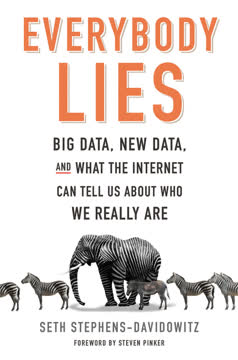Key Takeaways
1. Economic incentives shape human behavior in unexpected ways
"The conventional wisdom is often wrong."
Incentives matter. People respond to incentives in ways that are not always obvious or intuitive. This applies to all aspects of life, from parenting to politics to business. For example:
- Teachers cheating on standardized tests to improve their schools' performance
- Sumo wrestlers deliberately losing matches to help fellow wrestlers
- Real estate agents selling their own homes for higher prices than their clients'
The key is to identify the true incentives at play in any given situation. Often, what appears to be altruistic or irrational behavior can be explained by hidden economic motivations.
2. Conventional wisdom often misses hidden causes and effects
"Knowing what to measure and how to measure it makes a complicated world much less so."
Question assumptions. Many widely accepted explanations for social phenomena are based on superficial correlations or gut feelings rather than rigorous analysis. By applying economic thinking and data analysis, we can uncover surprising truths:
- The legalization of abortion in the 1970s led to a significant drop in crime in the 1990s
- Swimming pools are more dangerous for children than guns
- Increased police presence reduces crime more effectively than longer prison sentences
Challenging conventional wisdom requires careful examination of data and a willingness to consider unconventional explanations.
3. Data analysis reveals counterintuitive truths about social issues
"Morality represents the way that people would like the world to work, whereas economics represents how it actually does work."
Look beyond surface-level explanations. By analyzing large datasets and applying economic principles, we can uncover hidden patterns and causal relationships that challenge our preconceptions about social issues:
- The true impact of school choice on student achievement
- The limited effectiveness of campaign spending in political elections
- The role of parenting practices in determining children's outcomes
Data-driven analysis often reveals that commonly proposed solutions may be ineffective or even counterproductive, while overlooked factors can have significant impacts.
4. Cheating and fraud are more prevalent than we realize
"If you're not cheating, you're not trying."
Incentives for dishonesty. Cheating and fraud occur in many areas of life, often in subtle ways that are difficult to detect. Examples include:
- Teachers altering student test scores to improve school rankings
- Sumo wrestlers fixing matches to maintain their rankings
- Online daters misrepresenting themselves to appear more attractive
Understanding the incentives that drive dishonest behavior can help design better systems and policies to prevent it. However, it's important to recognize that some level of cheating is likely inevitable in any system.
5. The power of unintended consequences in policy and society
"The conventional wisdom is often wrong."
Second-order effects matter. Well-intentioned policies and actions often have unforeseen consequences that can undermine their original goals or create new problems:
- Seatbelt laws leading to more reckless driving and pedestrian deaths
- Drug prohibition increasing violent crime and prison populations
- Minimum wage increases potentially reducing employment opportunities for low-skilled workers
Recognizing the potential for unintended consequences is crucial for effective policymaking and understanding complex social systems.
6. Creative solutions can address complex socioeconomic problems
"The answer to a question depends on how it is framed."
Think outside the box. By approaching problems from an economic perspective and considering unconventional solutions, we can find innovative ways to address social issues:
- Paying students for good grades to improve academic performance
- Using financial incentives to encourage organ donation
- Implementing congestion pricing to reduce traffic in urban areas
Creative problem-solving often involves rethinking incentives and challenging traditional approaches to policy and social interventions.
7. Economics provides a unique lens for understanding human nature
"The most likely result of any man's sudden disappearance is that his family and friends will conclude that he is off with another woman."
Homo economicus. Economic principles can help explain a wide range of human behaviors and social phenomena:
- The economics of dating and relationships
- Why people choose certain careers or lifestyles
- How social norms and cultural practices evolve over time
By applying economic thinking to everyday situations, we can gain new insights into human nature and social dynamics.
8. Information asymmetry influences markets and decision-making
"Information is the currency of the Internet. As a rule, the more information you give away, the more valuable you become."
Knowledge is power. Differences in information between parties can have significant impacts on markets and individual decisions:
- The role of expert knowledge in professions like medicine and law
- How online reviews and ratings affect consumer behavior
- The impact of transparency on business practices and government policies
Understanding and addressing information asymmetries can lead to more efficient markets and better decision-making for individuals and organizations.
9. Social norms and cultural factors impact economic outcomes
"The conventional wisdom is often wrong."
Culture matters. Economic behavior is influenced by social norms, cultural values, and local customs:
- How tipping practices vary across countries and industries
- The impact of religious beliefs on economic development
- How cultural attitudes towards risk affect entrepreneurship and innovation
Recognizing the interplay between economics and culture is essential for understanding global markets and designing effective policies across different societies.
Last updated:
FAQ
What's When to Rob a Bank about?
- Exploring Economic Concepts: The book delves into economic principles using unconventional and humorous anecdotes, illustrating how these theories apply to everyday life.
- Cheating and Incentives: It examines the prevalence of cheating across various fields and how incentives shape human behavior, suggesting that understanding these can lead to better decision-making.
- Challenging Conventional Wisdom: The authors challenge widely held beliefs by presenting data and alternative viewpoints, encouraging readers to question societal norms.
Why should I read When to Rob a Bank?
- Engaging and Informative: Written in a witty style, the book makes complex economic concepts accessible and enjoyable, appealing to a broad audience.
- Real-World Applications: It provides insights into how economic principles affect daily life, offering practical examples that illustrate the relevance of economics.
- Thought-Provoking Ideas: The authors encourage critical thinking about societal norms and policies, prompting reflection on issues like education, crime, and environmentalism.
What are the key takeaways of When to Rob a Bank?
- Incentives Matter: A central theme is that people's behavior is heavily influenced by the incentives they face, which can help predict and explain actions.
- Cheating is Common: The book highlights the prevalence of cheating, driven by incentives, challenging the notion of inherent honesty.
- Questioning Assumptions: Readers are urged to question conventional wisdom and consider alternative explanations for observed phenomena.
What are the best quotes from When to Rob a Bank and what do they mean?
- “If you’re not cheating, you’re not trying.”: This reflects the view that bending rules is often seen as necessary in competitive environments.
- “The best ideas often sound crazy at first.”: Emphasizes the importance of innovation and suggests that many successful concepts were initially dismissed.
- “Humans tend to overestimate small probabilities.”: Highlights a cognitive bias where people fear unlikely events more than they should, urging rational risk assessment.
How does When to Rob a Bank challenge conventional wisdom?
- Critique of Policies: The authors question the effectiveness of various policies by presenting data that contradicts popular beliefs, encouraging reevaluation.
- Behavioral Economics Insights: The book shows how cognitive biases lead people to act against their best interests, challenging the assumption of rational decision-making.
- Real-World Examples: Through anecdotes, the authors illustrate how conventional wisdom can lead to poor outcomes, highlighting the need for critical thinking.
How does When to Rob a Bank relate to behavioral economics?
- Decision-Making Under Pressure: The book illustrates how stress can lead to irrational decisions, a key focus of behavioral economics.
- Incentives and Behavior: It emphasizes the role of incentives in shaping behavior, aligning with the idea that people respond to rewards and punishments.
- Real-World Examples: Scenarios like bank robberies and sports decisions demonstrate behavioral economic principles in action.
What role does data play in When to Rob a Bank?
- Evidence-Based Arguments: The authors use data to support their claims and challenge assumptions, enhancing the credibility of their arguments.
- Analyzing Trends: Statistical analysis is used to uncover patterns in fields like education and crime, helping readers understand complex issues.
- Encouraging Skepticism: By presenting data that contradicts popular beliefs, the authors promote a more analytical mindset when evaluating information.
How does When to Rob a Bank address the topic of cheating?
- Prevalence of Cheating: Cheating is shown as a common response to misaligned incentives, occurring in education, sports, and business.
- Incentives and Consequences: The structure of incentives often leads individuals to cheat, with little regard for ethics.
- Cultural Acceptance: In some contexts, cheating is normalized, reflecting broader cultural attitudes towards competition.
What are some surprising findings in When to Rob a Bank?
- Walking Drunk is Dangerous: Walking while intoxicated is revealed to be more dangerous than driving drunk, challenging common perceptions.
- Impact of High Gas Prices: High gas prices can lead to positive environmental outcomes, such as reduced driving, highlighting economic behavior's complexity.
- Endangered Species Act Consequences: The Act may inadvertently lead to habitat destruction, questioning the effectiveness of certain environmental policies.
What concepts in When to Rob a Bank are most important?
- Loss Aversion: People are more motivated to avoid losses than to achieve gains, influencing decision-making.
- Statistical Discrimination: Biases affect economic outcomes, particularly in online marketplaces where race impacts sales.
- Behavioral Economics: The book explains why people often make irrational choices, especially under pressure.
How do Levitt and Dubner use humor in When to Rob a Bank?
- Witty Anecdotes: Humorous stories make complex economic concepts more relatable and engaging.
- Playful Language: A lighthearted tone helps demystify serious topics, making the book enjoyable.
- Satirical Observations: Satire is used to critique societal norms, encouraging critical thinking.
What methods do Levitt and Dubner use to present their arguments in When to Rob a Bank?
- Data Analysis: Statistical evidence supports claims about crime and economics.
- Field Experiments: Real-world experiments test hypotheses, providing empirical evidence.
- Narrative Storytelling: Compelling narratives illustrate economic principles, making content accessible.
Review Summary
When to Rob a Bank received mixed reviews, with ratings ranging from 1 to 5 stars. Many readers found the book entertaining and thought-provoking, praising its wide range of topics and unconventional perspectives. However, critics felt it lacked depth and coherence, being a collection of blog posts rather than a cohesive work. Some appreciated the book's format for easy reading, while others found it superficial and disconnected. The authors' writing style and humor were generally well-received, but some readers felt the content was too random or poorly researched.
Freakonomics Series
Similar Books









Download PDF
Download EPUB
.epub digital book format is ideal for reading ebooks on phones, tablets, and e-readers.







